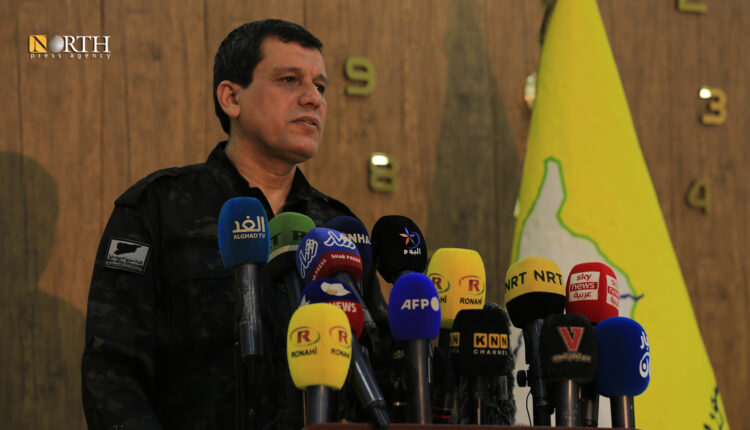Syria’s Kurdish SDF Commander Welcomes PKK’s Dissolution as Path to Regional Peace
By Kardo Roj
QAMISHLI, Syria (North Press) – General Mazloum Abdi, Commander-in-Chief of the Syrian Democratic Forces (SDF), on Monday praised the Kurdistan Workers’ Party (PKK) for what he described as a “historic and courageous” decision to dissolve its organizational structure and end over four decades of armed struggle, marking what he called a pivotal moment for politics and peace in the Middle East.
Earlier in the day, the PKK issued a formal statement announcing the dissolution of its core armed apparatus and the cessation of its military campaign against the Turkish state. The move, reportedly taken in response to a longstanding call from imprisoned Kurdish leader Abdullah Öcalan, signifies a major shift in one of the region’s most entrenched and contentious conflicts.
In a statement posted on Platform X (formerly Twitter), General Abdi said, “The PKK’s decision to dismantle its organizational structure, end the armed struggle, and adopt democratic politics based on the call of leader Abdullah Öcalan is commendable. We are confident this step will pave the way for a new phase of politics and peace in the region.”
A Turning Point in Kurdish-Turkish Relations
The decision could mark a transformative moment in the complex dynamics between Kurdish movements and the Turkish state. The PKK, designated as a terrorist organization by Turkey, the U.S., and the EU, has been at war with Ankara since 1984 over Kurdish rights and autonomy. The conflict has claimed tens of thousands of lives and displaced millions, affecting regional stability across borders.
General Abdi’s remarks, while cautious, reflect an underlying optimism for what this shift might mean not only for Turkey’s domestic peace but also for wider geopolitical recalibration involving Kurdish populations in Syria, Iraq, and Iran. As the leader of the SDF—a multi-ethnic force backed by the U.S. and operating under the governance of the Autonomous Administration of North and East Syria (AANES)—Abdi’s perspective carries weight across international and regional spheres.
“The PKK has played a historic role in the Middle East over the past decades,” Abdi noted, implying the organization’s broader impact on Kurdish identity and rights movements throughout the region.
Implications for Northeast Syria
While the PKK’s decision is centered on Turkey, its reverberations are likely to be felt deeply in northeast Syria, where the AANES continues to advocate for a democratic, decentralized model of governance in the post-conflict Syrian landscape. Though the SDF and AANES maintain distinct organizational structures and goals, historical ties and overlapping ideologies with Kurdish movements in the region make the developments significant.
Analysts believe the PKK’s demilitarization could reduce regional tensions and open the door to new diplomatic engagements, particularly as the AANES seeks greater recognition and stability amid a volatile regional backdrop that includes Turkish military operations, ongoing threats from ISIS sleeper cells, and instability in neighboring areas controlled by armed opposition groups.
Cautious Optimism and International Responsibility
General Abdi concluded his message by calling on all relevant actors to support the process, urging “all parties to take meaningful steps and provide the necessary support.” His call appears directed at both regional governments and international stakeholders who have historically influenced the trajectory of Kurdish political movements.
While the road ahead remains uncertain, the dissolution of the PKK’s militant wing could signal a departure from decades of cyclical violence, making space for political solutions and democratic reforms. For the SDF and AANES, such a development may strengthen their long-standing narrative of political moderation, counterterrorism leadership, and commitment to stability in one of the world’s most complex conflict zones.
Looking Ahead
As stakeholders across the Middle East digest the implications of this announcement, the future of Kurdish politics and Turkey’s policy toward Kurdish entities may be at a crossroads. Whether this leads to genuine peace or a recalibration of long-standing hostilities will depend largely on reciprocal steps and sustained international engagement.
For now, northeast Syria’s leadership appears cautiously hopeful, positioning itself as a supporter of peace-building efforts amid enduring regional turbulence.

